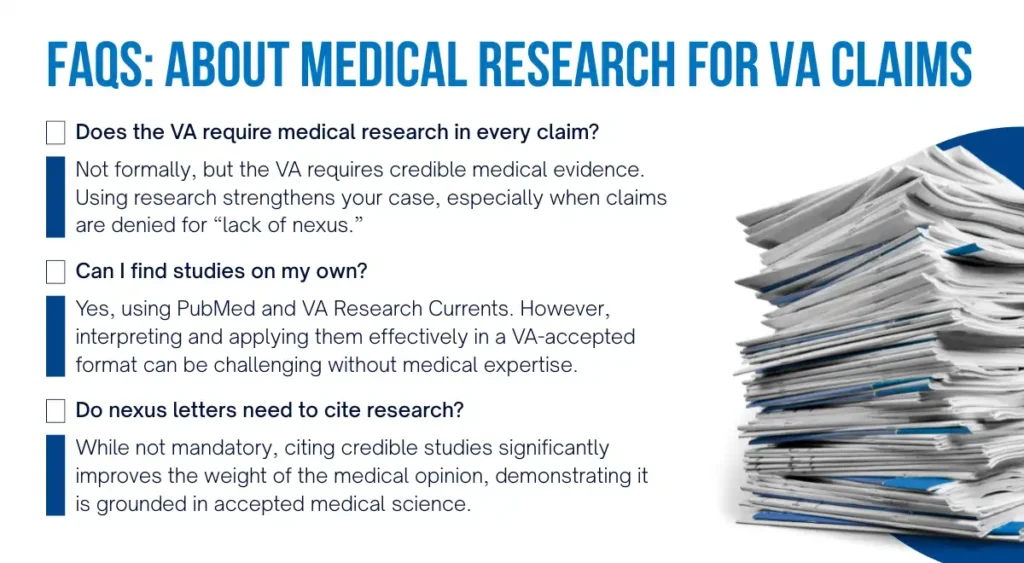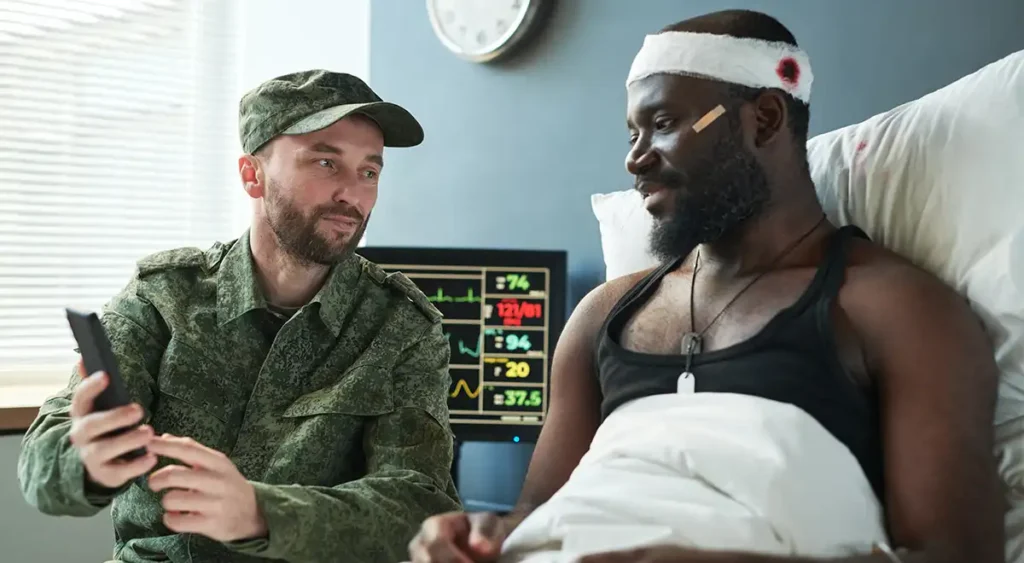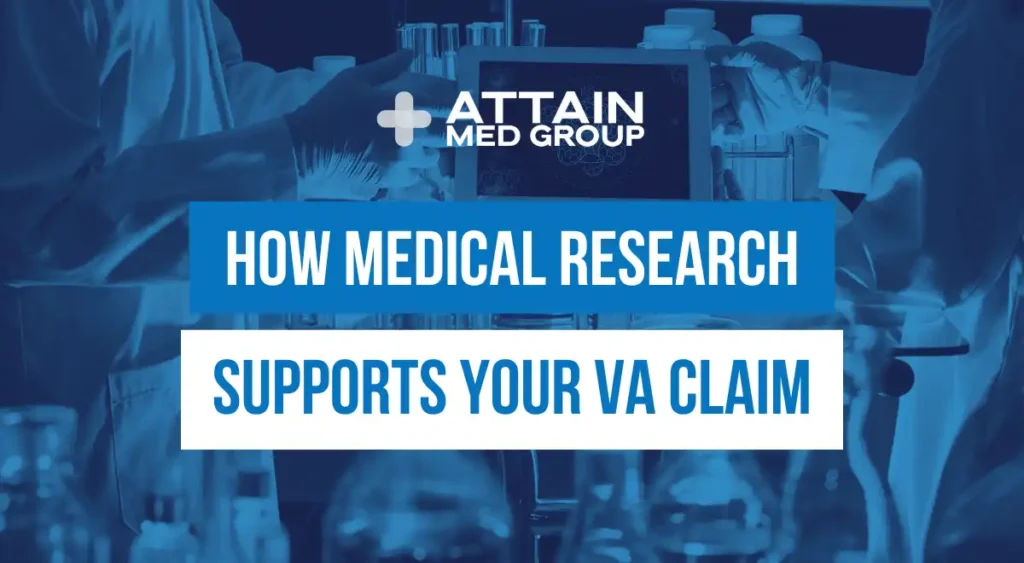If you’re a veteran filing for VA disability benefits, having a diagnosis and service connection alone often isn’t enough. The VA wants clear, credible medical evidence that supports your claim, connecting your condition to your service or to a service-connected disability.
At Attain Med Group, we specialize in providing expert-level nexus letters, independent medical opinions, and medical record reviews that incorporate current, peer-reviewed medical research to strengthen your case.
In this guide, you will learn:
✅ Why medical research matters for your VA claim.
✅ How to find credible studies to support your condition.
✅ How to present this evidence effectively in your claim.
✅ Why expert guidance can save you time, stress, and denials.

Why “Medical Evidence for VA Disability” Matters
The VA operates on “evidence-based adjudication.” Even if your symptoms are severe, if you cannot medically prove service connection or aggravation, your claim may be denied.
Medical research:
- Validates the medical pathways connecting your condition to your service or another service-connected disability.
- Shows your provider’s opinion is grounded in current medical science.
- Addresses VA skepticism about conditions without clear presumptive service connection.
Incorporating peer-reviewed studies, VA research, and institutional guidelines can turn your claim into well-supported evidence the VA can act on.
Examples of How Medical Research Strengthens Claims
- Sleep Apnea Secondary to PTSD: Studies from Sleep Medicine Reviews (2018) show veterans with PTSD have a higher prevalence of obstructive sleep apnea due to hyperarousal and disrupted sleep architecture.
- Migraines Secondary to TBI: Research from The Journal of Headache and Pain demonstrates a strong correlation between post-concussive syndrome and chronic migraines.
- GERD Secondary to PTSD: VA research has documented the stress-hormone pathway impact of PTSD on gastrointestinal function, supporting secondary service connection claims.
By referencing such studies in your nexus letter or medical records review, you align your evidence with accepted medical understanding, making it harder for the VA to deny your claim for “lack of nexus.”
How to Find Credible Studies for Your VA Claim
When looking for medical evidence for VA disability claims, prioritize credible, up-to-date, peer-reviewed sources. Here’s where to look:
✅ PubMed (https://pubmed.ncbi.nlm.nih.gov): Free database of peer-reviewed medical studies on nearly every condition.
✅ VA Research Currents (https://www.research.va.gov/currents.cfm): Highlights VA-funded studies related to veteran health issues.
✅ National Institutes of Health (https://www.nih.gov/): Research summaries and links to current studies on specific conditions.
✅ Google Scholar (https://scholar.google.com/): Accessible tool for finding medical journal articles, clinical studies, and case reports.
What to Look For:
- Studies involving veterans or active-duty military populations when possible.
- Research supporting secondary service connection (e.g., PTSD linked to sleep apnea).
- Studies within the last 10 years to ensure the evidence is current.
- Articles from reputable journals (e.g., Journal of Clinical Sleep Medicine, The Lancet, JAMA).
How to Use Medical Research in Your Claim
Including medical research effectively requires it to be integrated into your nexus letter and medical documentation in a way the VA will recognize:
✅ In Your Nexus Letter: Your medical provider should cite studies explicitly when explaining how your condition is “at least as likely as not” related to service.
✅ In Your Personal Statement: Reference your symptoms and align them with findings in the cited studies to show consistency.
✅ During C&P Exams: Be prepared to discuss the connection with your examiner, backed by recognized medical pathways.

Real-World Example: Sleep Apnea Secondary to PTSD
Veteran’s Situation: A combat veteran with service-connected PTSD developed sleep apnea but was denied secondary service connection.
What Changed: By obtaining a nexus letter from Attain Med Group, citing:
- Sleep Medicine Reviews (2018) linking PTSD and OSA prevalence,
- VA research on hyperarousal disrupting sleep architecture,
- VA-compliant language (“at least as likely as not”),
The veteran’s denial was reversed, resulting in approval for secondary service connection and back pay.

Why Choose Attain Med Group
At Attain Med Group, we:
✅ Bridge the gap between veterans and independent medical experts.
✅ Craft VA-compliant nexus letters referencing credible medical research.
✅ Review your medical records in-depth to align evidence with your claim.
✅ Help veterans simplify complex claims and improve their chances of approval.
We don’t just generate paperwork; we build evidence-based medical narratives that hold up to VA scrutiny.

Take the Next Step: Strengthen Your Claim with Research-Based Medical Evidence
Your service deserves recognition, and your health challenges deserve fair compensation. Let Attain Med Group help you build a claim that reflects your reality with evidence the VA respects.
✅ Contact us today to book your consultation.
✅ Download our free guide: “How to Build Medical Evidence for Your VA Claim.”


